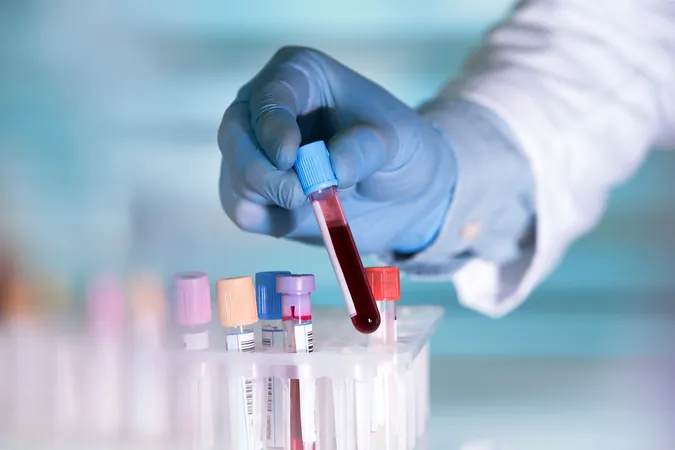
Which Colorectal Cancer Screening Method Is Best? The Surprising Truth About Blood Tests vs. Colonoscopies!
2024-10-31
Author: Jia
Recent Studies Highlight Screening Effectiveness
Recent studies cast a shadow on the effectiveness of emerging blood-based colorectal cancer screening tests compared to traditional methods like colonoscopies and stool-based tests. According to research published by Ladabaum et al. in the Annals of Internal Medicine, while blood tests may seem like an easier option, they have not proven to be as effective in identifying early cancers and precancerous polyps. A shift towards these blood tests could potentially lead to increased mortality rates from colorectal cancer.
The Colorectal Cancer Landscape
Colorectal cancer is the third most common cancer diagnosed in both men and women in the U.S., with about 4% of adults expected to be diagnosed with it in their lifetime. Fortunately, regular screening can significantly reduce the risk of developing and dying from this disease. The U.S. Preventive Services Task Force recommends that all adults aged 45 to 75 undergo routine screening.
For years, the standard screening procedures have revolved around colonoscopies—which not only detect cancer but can also remove polyps before they become malignant— or stool-based tests, done every 1 to 3 years. However, data indicates that a significant 33% of eligible adults have never been screened.
The Rise of Blood Tests
In a bid to increase screening rates, the FDA approved multitarget stool-based screening tests in 2014. By summer 2024, novel blood tests capable of detecting cancer DNA in the bloodstream were also approved. These methods appear attractive due to their non-invasive nature, yet early evidence suggests they struggle with effectively diagnosing precancerous conditions.
Dr. Uri Ladabaum, a professor at Stanford Medicine and lead author of the study, notes, "While blood-based screening tests are an exciting advancement, those who are able to have higher efficacy methods should prioritize them." Although these blood tests could attract patients hesitant to undergo screenings, there is a concern about the potential increase in mortality if patients opt for them over more traditional methods.
The Numbers Behind Screening Efficacy
In the study's simulations involving 100,000 average-risk individuals, those receiving colonoscopies every ten years had 1,543 new cancer cases and 672 cancer-related deaths. Stool tests conducted every 1 to 3 years resulted in a higher incidence, with deaths ranging from 904 to 1,025. In stark contrast, the blood test approach led to approximately 4,365 cancer cases and as many as 1,679 fatalities—about 2.5 times the death rate compared to those screened via colonoscopy.
Additionally, the costs associated with blood-based tests proved less economical compared to colonoscopy and stool tests, further complicating their practicality.
Patient Insights and Future Implications
For blood tests to positively impact colorectal cancer mortality, it is vital that patients follow up with colonoscopies when results indicate a positive screening. Dr. Ladabaum cautions, "Blood tests are certainly better than doing nothing, but transitioning from colonoscopy to first-generation blood tests could worsen outcomes and escalate healthcare costs."
As ongoing research continues, understanding patient preferences regarding screening will be essential. The goal remains clear: to encourage as many individuals as possible to participate in effective screening protocols to combat colorectal cancer.
Dr. Ladabaum concludes, “Combining different methods may become key to enhancing screening participation across diverse populations.”
As colorectal cancer screening evolves, all eyes will be on how patients and healthcare providers navigate these new options for the best potential outcomes. The ultimate question remains: will promising advancements truly lead to better health outcomes, or will they simply misguide patients away from the most effective strategies in this ongoing battle against cancer?




 Brasil (PT)
Brasil (PT)
 Canada (EN)
Canada (EN)
 Chile (ES)
Chile (ES)
 España (ES)
España (ES)
 France (FR)
France (FR)
 Hong Kong (EN)
Hong Kong (EN)
 Italia (IT)
Italia (IT)
 日本 (JA)
日本 (JA)
 Magyarország (HU)
Magyarország (HU)
 Norge (NO)
Norge (NO)
 Polska (PL)
Polska (PL)
 Schweiz (DE)
Schweiz (DE)
 Singapore (EN)
Singapore (EN)
 Sverige (SV)
Sverige (SV)
 Suomi (FI)
Suomi (FI)
 Türkiye (TR)
Türkiye (TR)